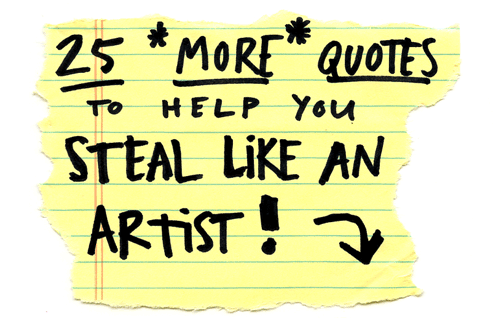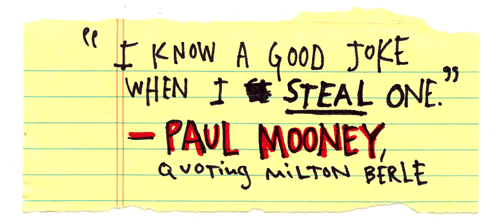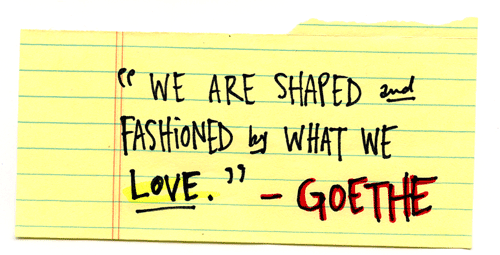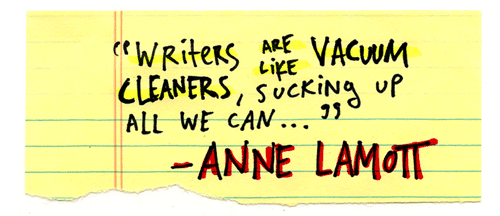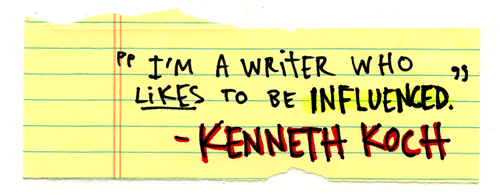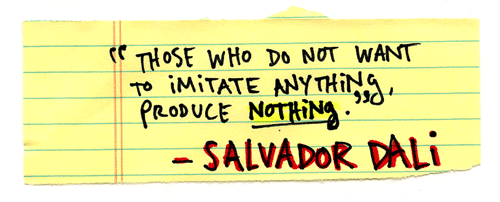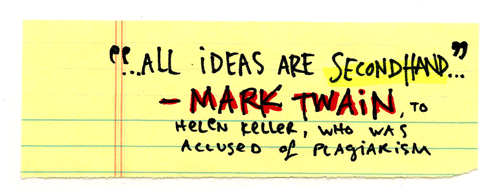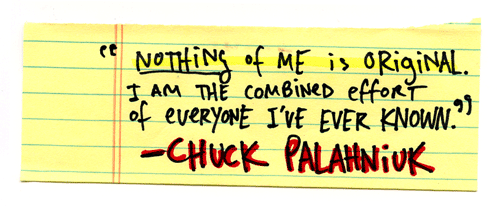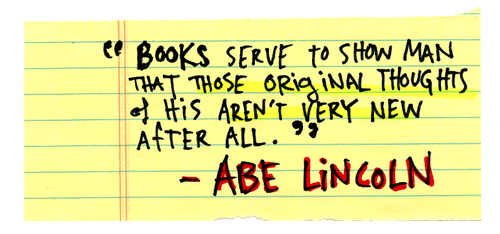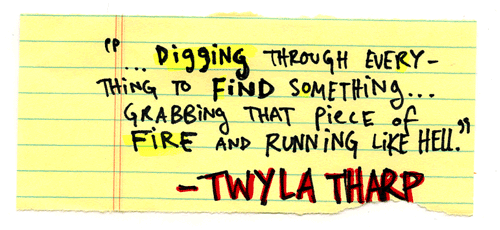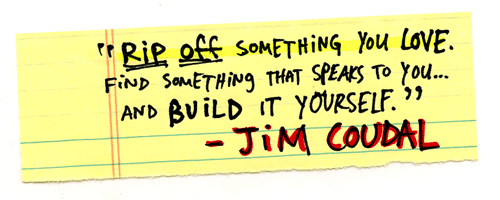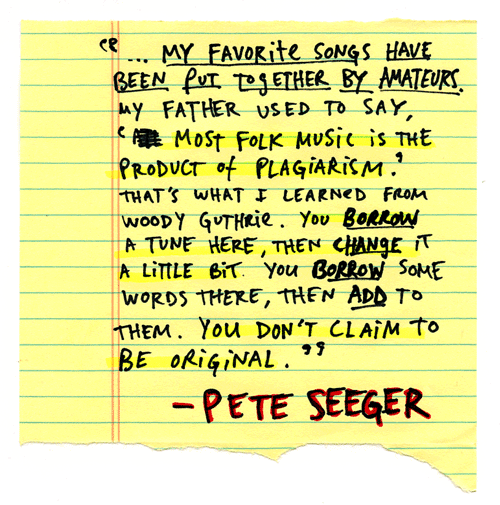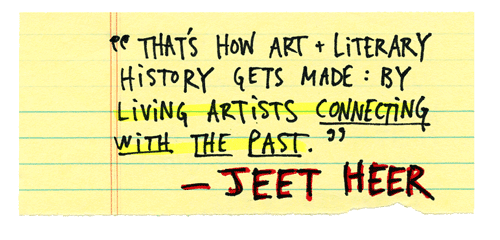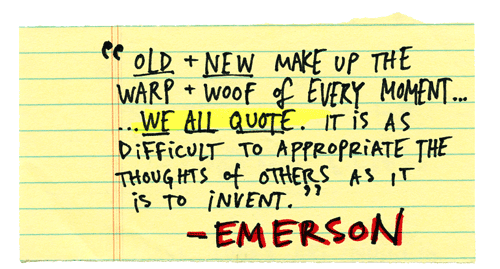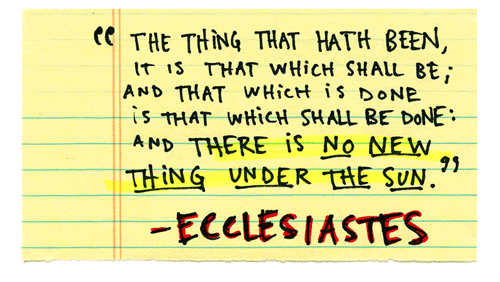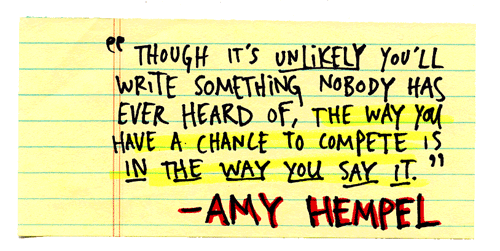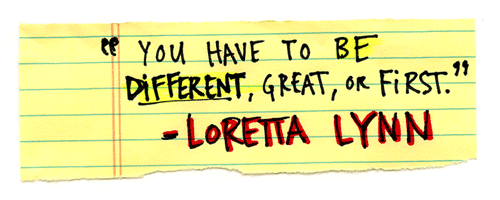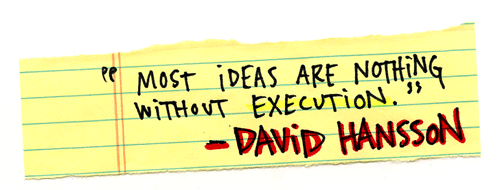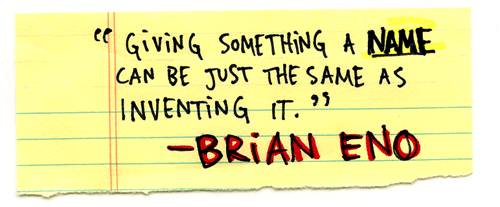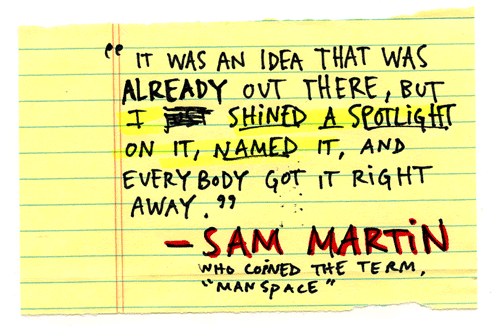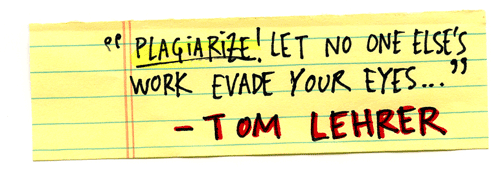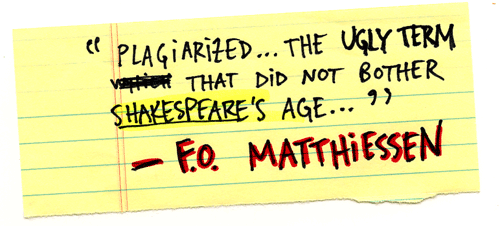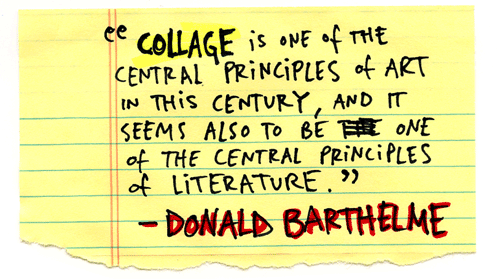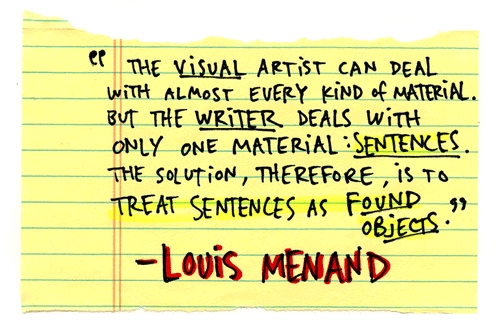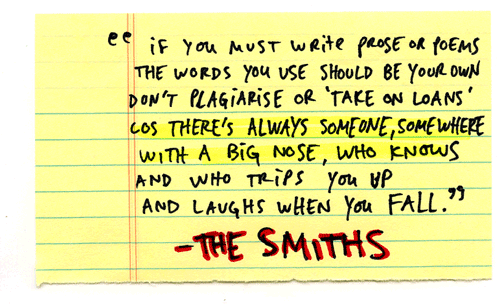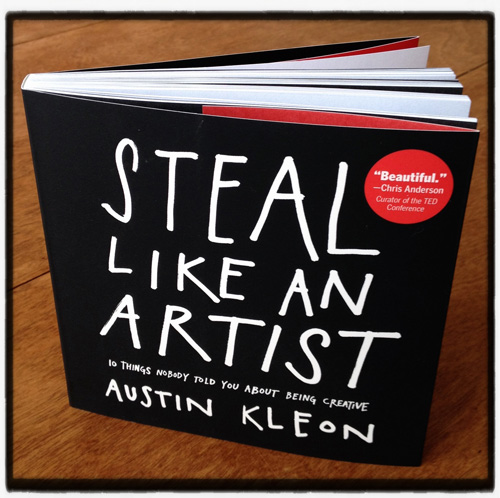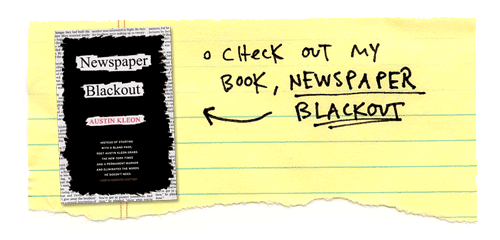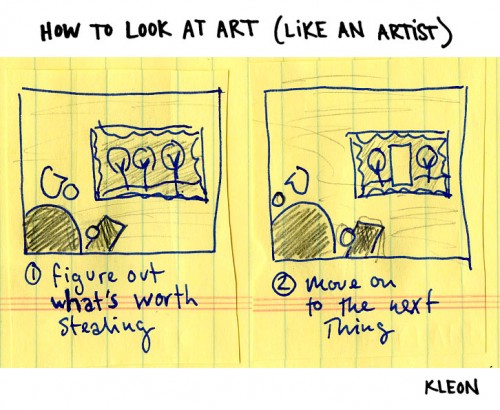25 QUOTES TO HELP YOU STEAL LIKE AN ARTIST
I think of almost everything in terms of collage.
My poems are made up of bits and pieces of words I’ve taken from newspaper articles.
My drawings are simply collages of points, lines, triangles, circles, and squares. I take Saul Steinberg’s faces, Otto Soglow’s hands, John Porcellino’s lines, Lynda Barry’s handwriting…
I myself am simply a collage of my ancestor’s DNA, mixed with the hundreds of thousands of words and images and ideas that my brain has absorbed.
Etc.
These are all quotes and doodles I abandoned while working on a presentation for next week’s PechaKucha night here in Austin.
Most of these notes were grabbed from my tumblr tags on “collage“, “influence“, and “originality” or “plagiarism.” I grabbed one or two from Jonathan Lethem’s incredible essay, “The Ecstacy of Influence.”
Next time you’re stuck, think of your work as a collage. Steal two or more ideas from your favorite artists and start juxtaposing them. Voila.
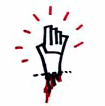
“Nothing is original. Steal from anywhere that resonates with inspiration or fuels your imagination. Devour old films, new films, music, books, paintings, photographs, poems, dreams, random conversations, architecture, bridges, street signs, trees, clouds, bodies of water, light and shadows. Select only things to steal from that speak directly to your soul. If you do this, your work (and theft) will be authentic. Authenticity is invaluable; originality is nonexistent.”
—Jim Jarmusch
“If you think a man draws the type of hands that you want to draw, steal ‘em. Take those hands.”
—Jack Kirby
“You can’t steal a gift. Bird [Charlie Parker] gave the world his music, and if you can hear it you can have it.”
—Dizzy Gillespie
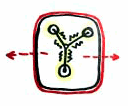
A good poet will usually borrow from authors remote in time, or alien in language, or diverse in interest.”
— T.S. Eliot
“In the grand collage that is Dada, past and future are equally usable.”
— Andrei Codrescu
“Our souls as well as our bodies are composed of individual elements which were all already present in the ranks of our ancestors. The “newness” in the individual psyche is an endlessly varied recombination of age-old components.”
—Carl Jung
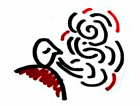
“Most artists are brought to their vocation when their own nascent gifts are awakened by the work of a master. That is to say, most artists are converted to art by art itself. Finding one’s voice isn’t just an emptying and purifying oneself of the words of others but an adopting and embracing of filiations, communities, and discourses. Inspiration could be called inhaling the memory of an act never experienced. Invention, it must be humbly admitted, does not consist in creating out of void but out of chaos.”
—Lewis Hyde
“The choices a writer makes within a tradition – preferring Milton to Moliere, caring for Barth over Barthelme – constitute some of the most personal information we can have about him.”
—Zadie Smith
“If an artist may say nothing except what he has invented by his own sole efforts, it stands to reason he will be poor in ideas. If he could take what he wants wherever he could find it, as Euripides and Dante and Michelangelo and Shakespeare and Bach were free, his larder would always be full, and his cookery might be worth tasting.
— R G Collingwood
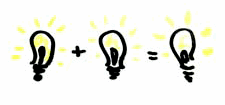
“Every idea is a juxtaposition. That’s it. A juxtaposition of existing concepts.”
— Steven Grant
“I wanted to hear music that had not yet happened, by putting together things that suggested a new thing which did not yet exist.”
— Brian Eno
“Really the truth is just a plain picture. A plain picture of, let’s say, a tramp vomiting in the sewere. You know, and next door to the picture Mr. Rockefeller or Mr. C. W. Jones on the subway going to work. You know, any kind of picture. Just make a collage of pictures.”
—Bob Dylan
“Sometimes I think everything I draw is just a combination of all of the millions and millions of drawings I’ve seen.”
—Dash Shaw
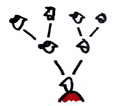
“If you steal from one author, it’s plagiarism; if you steal from many, it’s research.”
— Wilson Mizner
“If you have one person you’re influenced by, everyone will say you’re the next whoever. But if you rip off a hundred people, everyone will say you’re so original!”
— Gary Panter
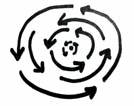
My hobbie (one of them anyway)…is using a lot of scotch tape… My hobbie is to pick out different things during what I read and piece them together and make a little story of my own.”
—Louis Armstrong
“The beauty of the collage technique is that you’re using sounds that have never met and were never supposed to meet. You introduce them to each other, at first they’re a bit shy, clumsy, staring at their shoes. But you can sense there’s something there. So you cut and paste a little bit and by the end of the song you can spot them in the corner, holding hands.”
— Jens Lekman
“To spark my creativity…I often re-use pieces from my other works…basically collaging my own stuff…”
—Nate Williams
“All writing is in fact cut-ups. A collage of words read heard overheard. What else?”
—William S. Burroughs

“I love art, I love being thrilled by art, and I love folding these thrills into my own practice. I love stealing….I absolutely believe my best work lies ahead of me, and lies in the work I’m absolutely on fire to steal from.”
—Tom Hart
“I was…attacked for being a pasticheur, chided for composing “simple” music, blamed for deserting “modernism,” accused of renouncing my “true Russian heritage.” People who had never heard of, or cared about, the originals cried “sacrilege”: “The classics are ours. Leave the classics alone.” To them all my answer was and is the same: You “respect,” but I love.”
—Igor Stravinsky
“Some one may say of me, that I have here only made a nosegay of other men’s flowers, having furnished nothing of my own but the thread to tie them.”
— Montaigne
“I’m being given a little bit of credit now as being a viable collage artist, which some people think is ridiculous. Like this guy who said, “Wait a minute: You had an art show where you just cut out pictures and then glued them back together?” And I said, “Yeah, that’s pretty much what it is.” There’s more to it than that. It’s about having the eye for detail, moving things from one environment and reassembling them into new environments….Everyone can do it, but not everyone can do it well.”
—Robert Pollard
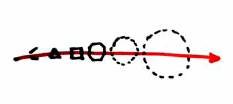
“Immature poets imitate; mature poets steal; bad poets deface what they take, and good poets make it into something better, or at least something different. The good poet welds his theft into a whole of feeling which is unique, utterly different from that from which it was torn; the bad poet throws it into something which has no cohesion.”
— T.S. Eliot
“It’s not where you take things from—it’s where you take them to.”
— Jean-Luc Godard
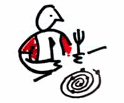
Add your favorites and anything I missed in the comments below.
DRAW YOURSELF A MAP
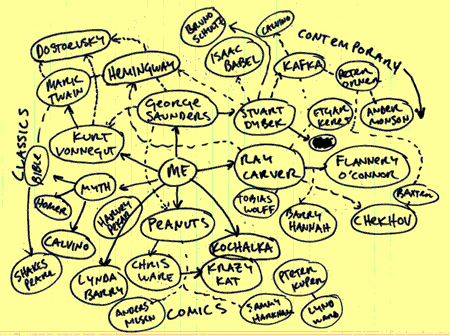
I was on the phone one day with my friend Brandon. Brandon’s a writer, been a serious one for a lot longer than I have, so whenever I get him in a conversation, I drop a little, “So what’re you working on?” question somewhere in the middle of things, a little bait, to see if maybe he’ll bite and spill the beans.
“Oh, I’m just reading, mostly.” The kind of answer that drives me nuts.
So I said, “Well, what are you reading?”
He told me he was picking out certain authors, and then reading everything that author had ever written. (I think at the time, he was tackling Flannery O’Connor, James Baldwin, and Ian McEwan.) I freaked out a little bit, and said, “Jesus, man, how disciplined of you! I can’t even finish a novel!”
So I hung up later, and got to thinking about his project. A few days earler, I’d read a line of advice from G.S.: “Find two or three writers that you’re really excited about. Follow their lineage back. Know everything about them. Immerse yourself in those writers.” This really clicked with me.
Since I started working in a library, I’ve been on book overload. I can get any book, anytime. No limits. Always a bad idea. So much to read. So little time. Really overwhelming. But this, this was a really great idea: Take it slow and steady. Saturate yourself with a writer’s work. Figure out who means the most to you right now, and then read who meant the most to them. No problem.
But how to begin? A list seemed too linear. What I needed was a map.
I’ve always been a nut about genealogy. When I was in undergrad, Brandon gave me a book of Carver stories. I fell in love with them. Then I found out our teacher had been taught by John Gardner, the same John Gardner who taught Ray Carver. I started building this goof-ball lineage in my mind…that I was somehow inheriting what had come before me.
A family tree!
So once in a while, when I’m feeling lost, feeling a little schizophrenic in my reading habits, I’ll draw a dorky map like the one above, who I’ve read, who I should read.
Where I am, where I should be going.

